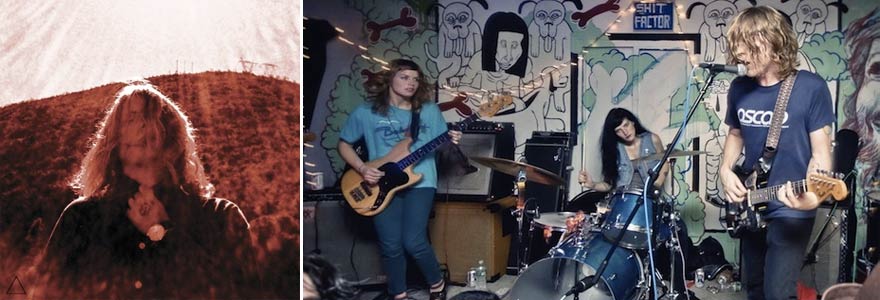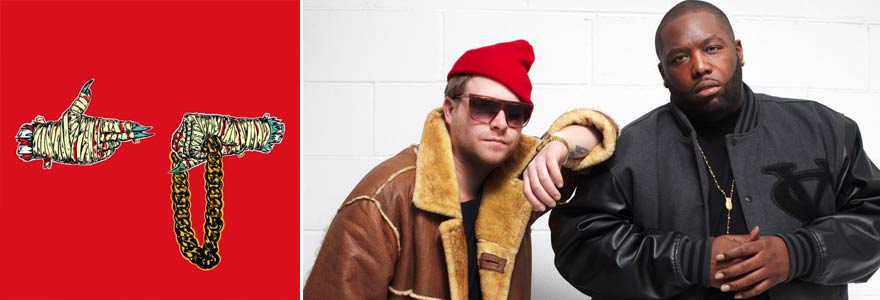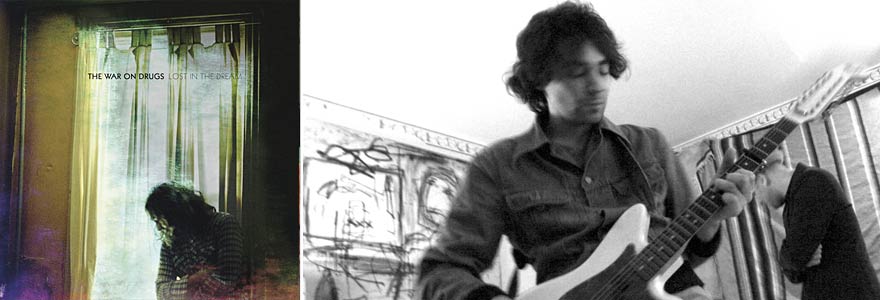Way Too Indie’s 20 Best Albums of 2014

In a year filled with world politics and tragedies, it’s only fitting triumph was a common theme found in music during 2014. For every senseless crime, there was a gratifying album in direct response to it. Those seeking self-love and acceptance found comfort in the arms of Perfume Genius and Jack White. Those looking for poignant social commentary discovered it through the words of Run The Jewels. Moreover, those who yearned for isolation found solace in Angel Olsen’s latest album. In between all of that were three career defining releases from St. Vincent, The War on Drugs, and FKA Twigs. Our list highlights 20 albums that are all pleasing distractions during this time of uncertainty.
Way Too Indie’s Best Albums of 2014
#20 Ty Segall – Manipulator

Manipulator is a wormhole consisting of atoms that are charged from the past and atoms reinterpreted for the present. Manipulator is a murky mix that only a producing maniac like Ty Segall could release. Ty has a deep discography that would take weeks to dissect, yet he is only 26. If Jack White is the hardest working man in rock music, then Ty must be his crazy stepbrother. This isn’t your father’s rock and roll or the 90’s Nirvana off shoot band your brother started in high school. Manipulator is a fast, grimy, blazing sound that embodies everything Ty has been working towards. This album truly sounds like an artist who cannot foresee not putting out his creations. Vacuumed in an airtight room, the album kicks off with the title track. It rides under an overcast and fuzzy sky of its influences where the drums, guitars, and Ty all squeal.
This album is a cornucopia that has been reshaped with sounds spanning different genres. At the same time, Manipulator also feels personal. “The Clock” tackles the burning desire of an artist who sees time as a small window for creativity and output; “The Singer” is a tale of how fans sometimes fail to appreciate the showmanship of art because they always want more. The theatrical highlights include “Tall Man Skinny Lady” and “It’s Over.” Manipulator floats on a hazy comfortable horizon. It delivers some truths and mounts Ty as the brightest student from the rock and roll school of thought. [Sami]
#19 Alex G – DSU

DSU is a strong poetic beauty. Alex G humanizes various tidal waves of emotions in a category that manages to leap outside the boundaries of dream pop and lo-fi. Sharp and short whimsical flavors structure this full-length, as Alex sounds about as wise as your father. It’s refreshing to encounter a project from a youthful songwriter who writes in a succinct and ageless voice. The lyrics are surrounded by familiar sounds that contain their own quirks and riffs. Alex G is a serious songwriter; his sound is vibrant with or without its influencers. DSU feels sensible, but a closer look reveals an adolescent façade. It’s a lush garden of prosperous lyrical landscapes. The dream-chasing “Harvey” is an ornament for anyone working towards something special. Even with a short life span, “Harvey” manages to induct pleasant-sounding grooves and proves to be Alex G at his best.
There are many other standouts. “Promise” is an eclectic mix of funky drowning sounds lost in a dreamland. The dense drums intersect to produce a sweet aural hallucination. Dazzling instrumentals also create a nice contrast to the dim lyrics of “Hollow”, where Alex kicks this track into a smooth four minutes. In just this short time, the ambiance goes from a grunge essence to something trance and then to something tame. “Boy” is a gem. “I am not the boy you knew”, Alex vows in this coming of age song. It’s quaint and ends with a grand piano. From the deeply emotive “Sorry” to the last track “Boy”, much of what Alex G accomplishes creates a desire for his next move. [Sami]
#18 White Lung – Deep Fantasy

There are EPs longer than this album, yet here it is on the list. Deep Fantasy is actually pretty shallow in terms of its lengths; where the depth appears is in the low-pitch, rapid guitars, militant percussion, devilish shrieking, and harrowing lyricism. Guitarist Kenneth William hits virtually every guitar note possible throughout this album, Anne-Marie Vassiliou storms the field with her steadfast drumming, and vocalist Mish Way ignites the fire burning in front of these songs. Her lyrics, which balance the personal and the political, provide the true fuel for the flames: check the eating disorder study “Snake Jaw” and the ailing sexual assault victim anthem “I Believe You” for proof. The latter track is a pretty succinct summary of Deep Fantasy’s unique flicker: listen to the passion with which Way consoles her friend that, despite the constant social and institutional tendency to doubt or dismiss rape claims, she wholly trusts her friend and encourages her to stay strong and fight for justice. The assertiveness of this stance is brashly echoed by her band’s hyperactive, harsh punk and her searing beckon, a combination that pervades this 22-minute Fantasy. [Max]
#17 MØ – No Mythologies to Follow

Possessing pop versatility is a true art that took MØ only one album to achieve. No Mythologies to Follow is a cohesive, ironic blend with a touch of mainstream sensibilities. MØ translates to virgin or maiden in Danish, but this album never alludes to its freshman status. At her very best, MØ’s formula for success is undressed and unedited. Many layers of synths, vibrant bass, thick, clashing drums, and the sweet influences of electronic music fuse neatly. There’s a satisfying mixture of accessible sounds combined with her own independent quirks. “Glass” doesn’t play coy and quickly drops the line, “Oh dear one turn the lights off/So our horny souls can have some private time.” It’s a whirlwind of pleasing tones mixed with tempting drums and disdained lyrics about growing older. Most songs are a heavy packet filled with a very zealous workload. That’s not such a bad thing when she creates tracks like “Maiden” that have waves of surging synths that transport listeners with her delicate and mystical voice. “Pilgrim” features running horns coated against clunky and infectious claps. No Mythologies to Follow is a welcomed aggregation of sounds that positions MØ towards pop star status. [Sami]
#16 TEEN – The Way and Color

“It’s so not personal” is the first phrase heard in TEEN’s “Not for Long”, the second track from their sophomore album The Way and Color. The irony here is that, well, the songs here are pretty damn personal. “Sticky”, for example, contemplates the spectrum of consequences that accompany an abortion; “Breathe Low and Deep” portrays a defeated narrator doing her best to cope. The weight of these stories might explain the major leap in songwriting from TEEN’s past work too. The same band once hauntingly distant from listeners on their debut now engage the ears with excellent vocal harmonies, flowing melodies, ominous psychedelia, and dreamy ambience. Whether via a groovy, uptempo escapade like “Tied Up Tied Down” or a more introspective stance as on “More Than I Ask For”, TEEN’s new compositional advancements consistently result in entrapping, gorgeous, afflicting psych pop. And all of this is obvious even before catching them in concert, a tremendous live show which seems to have gone overlooked by the community at large. At this rate, though, not for long. [Max]
#15 Real Estate – Atlas

There’s nothing idyllic to see here. Atlas is not a roadmap towards sunny waters. This album is a chamber of deep isolation that is thoughtfully constructed. At every corner, it is constantly reaching out for answers, as seen through relatable human emotions. Soft and clean guitars are still present as the band hands out a chronological guide. It’s easy to view this collection of songs as a series of inevitable events. It’s simple and timeless as Real Estate ventures to the past. The guitars and drums are so soft that they feel like a warm blanket of pillows. When they sing about going back to an unrecognizable hometown years later, you feel it. When they sing about a long distance relationship, you understand it. There’s a sad and poignant moment on the record where lead singer Martin Courtney, wonders if his words are resonating with whoever he is speaking to. “And I might as well be talking backwards/Am I making any sense to you?” he says in a melancholy voice supported by charming and sunlit instruments. Often these songs offer glimpse into the heart of someone searching for something tangible. Atlas is all encompassing journey for anyone who has ever faced an existential crisis about love or life. [Sami]
#14 Mitski – Bury Me at Make Out Creek

If this list were based purely on lyrics, Bury Me at Make Out Creek might be #1. Mitski Miyawaki wastes not a single breath, each and every word she utters as haunting and evocative as her newly intense, overwhelming instrumentals. “You’re the breeze in my Austin nights”, “I want a love that falls as fast as a body from the balcony”, “One word from you and I would jump off of this ledge I’m on, baby”, and “I don’t smoke except for when I’m missing you/to remember your mouth, how you tasted true” are only the most startling of the countless melting turns of phrase present here. These words are often accompanied with little more than a static, fragmented wall of guitar fuzz and unsettling drum machines, yet impact with the magnitude of a musical army. On the other hand, Make Out Creek is also full of sparser moments, but these are equally powerful. The almost violent guitar punch defining the latter half of opener “Texas Reznikoff” is just as heartbreaking as the spacious, steely dirge of “I Will.” This latter track may initially seem like the one song here on which Mitski has conquered her loneliness, but it’s actually a summary of what she wishes someone would say to her. If that’s not both tremendously upsetting and eerily beautiful, as is the entirety of Make Out Creek, then nothing is. [Max]
#13 Jack White – Lazaretto

Jack White is an Etch-A-Sketch. Categories, genres, and preconceived notions don’t apply here. His first solo album, Blunderbuss, was an aggregation of fire, electricity, and passion. Naturally, we all expected Lazaretto to be the fast spitting fire ball of energy that Blunderbuss was. When the lead single “Lazaretto” first dropped, the hip hop elements synced perfectly with his electrically charged vocals. Ultimately, Lazaretto set a precedent that no two Jack White projects will ever be the same. The album was inspired by a collection of poems and short stories that were written by Jack when he was a teenager. Those poems and stories served as the source materials for each song. Unbounded by his inspirations, Jack still inhibits his usual buoyancies and daze. The solely instrumental “High Ball Stepper” is an animated and lively track that serenades until the very end. It encompasses different densities and textures as Jack sweeps around different tints and shades. Quaint bluesy qualities are featured on the song “Entitlement”, while “Temporary Ground ” feels very Nashville. Lazaretto is an interesting Jack White album because it feels very bombastic and also tamed. It is consistently inconsistent. It is a melting pot. [Sami]
#12 Caribou – Our Love

In 2010, Caribou’s best song up to that point in his career, “Odessa”, placed him as the fly on the wall of a constantly fighting couple’s bedroom. Although vocalist and songwriter Dan Snaith expressed proper sympathy towards the relationship’s victimized female, he never offered any solutions for her to escape her pitiable state. On Our Love, his first album since then, he still doesn’t seem to have any answers, but he’s now writing from a first person perspective rather than an outsider’s point of view. First track “Can’t Do Without You” bemoans Snaith’s loss of a lover rather than proposing any method to get her back, and it’s not much longer before “All I Ever Need” is simply another list of woes. No complaints, though; if these troubles are leading to songs as cosmic, smooth, and hallucinogenic as these electronic jams, then let’s hope Snaith’s problems dissipate via some external force rather than his own resolution. Our Love is overflowing with gorgeous, colorful synth work that’s as entrancing as it is mobile. The title track is simultaneously warm and danceable, and “Mars” puts some serious swing into its trippy prettiness. The influence of R&B and deep house, novel informers for Caribou, account for Snaith’s newfound ability to merge the psychedelic, the heartfelt, and the body-moving. Check penultimate track “Back Home” as the strongest example of Our Love’s brilliant approach: a slowly bubbling piece of mind-melting R&B that ascends from ghostly vibrations into head-thumping wispiness, it’s the peak of a formula that consistently entrances across Our Love’s ten whole songs. [Max]
#11 Tennis – Ritual in Repeat

Nostalgia can be a knife in the back or a prosperous recalling. Tennis’ Ritual in Repeat is a testament to the latter. This husband and wife duo formulates a more grandiose and powerful record that both emulates the past and presents their own swatches of sounds. Rather than drowning in their influences, Tennis manages to bounce from decade to decade smoothly.
The roller skate jam “I’m Callin” sounds like an early 90s Celine Dion track that got stuck at an 80s dance party. There’s a noticeable dichotomy that latches onto this album. Stripped away and running free is when Alaina Moore’s voice is most exposed and empowering. However, this record also contains tracks that evoke a singalong jam band aura. More specifically, “Needle and The Knife” easily permeates through the track list with its tightly coupled percussion and string instrumentals. Ritual in Repeat marks the creation of their own wanderlust persona. Tennis avoids circles and stigmas by delivering one of the most likable records of the year. [Sami]
#10 Run the Jewels – Run the Jewels 2

“I’m finna bang this bitch the fuck out!” says a nuclear Killer Mike. The next three minutes are the beginning of a fueling atomic bomb. Run the Jewels 2 is an action-packed, pressure-pointing push against the chest, as Killer Mike and El-P instantaneously huff audacious lines. Towering over pompous beats, the duo creates stacks and layers that have contrasting tension. RTJ2 is a bombastic social commentary with strong meaning. The kinetic energy is high as Killer Mike aggressively asks for rival gangs to unite and El-P testifies that the court system is out of order. They take you down deep and brazen tunnels with lyrical traps like “You know your favorite rapper ain’t shit/And me, I might be/The closest representation of God you might see.” RTJ2 is still a captivating, fun time. “Close Your Eyes (And Count To Fuck)” is a nuclear power plant that generates invigorating energy. There’s a sharp chemistry between the duo that doesn’t feel calculated. At times, Killer Miller sets the stage for the main action, and El-P smoothly completes the cause. RTJ2 burns your skin, injects some social topics, and delivers a great time. [Sami]
#9 Makthaverskan – II

These five young Swedes use the English language better than many native speakers do. Where many of today’s best musicians get by on poetic, extravagant lyricism, Makthaverskan instead use the most elementary of words and images to achieve emotional resonance. The cries of “Fuck you! Fuck you!” that pin down “Antabus” could easily originate from the mouth of a histrionic teenager rather than these heavy-hearted 20-something-year-olds, and the piercing despair of “I don’t know where you are tonight, but if you want I’ll take you back” that grounds the chorus of “Something More” could fit inconspicuously on a pop punk record. Rather than obfuscating their pleas with dense wordplay, Makthaverskan can afford to be this upfront since their delivery is so genuine. “It’s not me you’re dreaming of!” might sound whiny and immature in worse hands, but Maja Milner’s urgency and her band’s Goth-drenched, new wave-indebted instrumentals ensure that these words land as potent daggers rather than as ignorable pouting. Makthaverskan’s cocktail of direct, heartfelt singing, dreamy, gorgeous, incisive instrumentation, and straightforward lyricism aren’t new in name, but rarely have they been combined so grippingly. [Max]
#8 Ava Luna – Electric Balloon

Brooklyn’s Ava Luna are the precise sum of a few very well known musical kooks (Deerhoof, Pixies, Dirty Projectors), yet have a fanbase that’s merely the size of their underground friends and soundalikes Krill (who, unrelated, are set to release one of next year’s best albums). Their mastery lies in their ability to spin the idiosyncrasies of their popular influences into a sound that’s uniquely theirs despite its obvious forebears, so why aren’t more people listening? Almost everyone who enjoys the music of their influences is bound to enjoy them, but few have discovered the flavorful gem known to the world as Electric Balloon.
Give it time, though. More listeners are bound to stumble upon this wonderful, jagged, soulful, experimental rock group; it’s inevitable with tunes this distinct and dissimilar. What other band could include a stuttered, manic punk barker like “Daydream” on the same record as the yelpy, teasing funk strut of “Sears Roebuck M&Ms” and make them sound like the same artist’s vision? Better yet, how many groups could place these two songs back to back and make them flow as though nothing about each is different? Maybe the same musicians capable of the stop-and-start fury and quiet of album highlight “Plain Speech” could. Clearly, Electric Balloon is a wacky, diverse collection – the flamenco-like “Aquarium” precedes the earnest, gleaming comedown of “PRPL” – and fans of the unhinged will flock to it in due time. [Max]
#7 Cloud Nothings – Here and Nowhere Else

On Cloud Nothings’ 2012 breakout Attack on Memory, songwriter and vocalist Dylan Baldi was furious about his dejection, resulting in eight harrowing post-punk gems that turned heads and attracted new fans. Two years later, Here and Nowhere Else shows Baldi finding the silver lining in his woes rather than just complaining about them. The album conveys that the new, more mature Baldi acknowledges his troubles, finds solutions to them, and successfully executes these strategies. This evolution results in a somewhat brighter, more developed sound, although the album is still consistently dark and noisy.
The mild reinvention of Cloud Nothings’ sound is evident the moment the album starts. “Now Hear In”, the opening track, begins with a traditional power chord riff that’s only barely overdriven, as compared to the scathing distortion of Attack on Memory tunes such as “Wasted Days” and “Our Plans.” The lyrics that soon follow contain a sliver of optimism previously unheard in Cloud Nothings’ work. “No use remembering how it used to be serene/And I can’t feel your pain and I feel alright ‘bout it,” Baldi muses about a failed past relationship, choosing to move on rather than drown in his self-pity. “You don’t really seem to care, and/I don’t even talk about it” from “No Thoughts” later echoes this sentiment, one which pops up constantly throughout the album.
Of course, we’re talking about Cloud Nothings here; even with a brighter mindset, Baldi knows he’s best capable of expressing emotions through noise, and there’s no absence of it here. His constant tightrope walk between lyrical positivity and angry noise dictates Here and Nowhere Else’s success; check the ascension from faintly sunny, clearly sung garage punk to sweltering noise barrages on tracks like “Psychic Trauma”, “Just See Fear”, and “No Thoughts” as proof. There’s no shortage of explosive, frantic drumming on these songs either, so it’s interesting that final track “I’m Not Part of Me”, which contains only the poppiest elements of this album, tends to be its best regarded. Maybe this acclaim stems from its bold statement of the album’s thesis: “I’m not telling you all I’m going through/I feel fine,” declares Baldi, and his confidence and hopefulness embody his latest masterpiece. [Max]
#6 The War on Drugs – Lost in the Dream

Lost in the Dream is the kind of treasure you hope to find in your grandparent’s attic. Adam Granduciel knows how to craft transatlantic gems. Each song feels like its own climatic mini-series. The craftsmanship that was put into this album was very labor intensive in the way that it feels like hurt, despair, confusion, pressure, love, and triumphance are all pillars that construct this album. In order to write songs like, “Under the Pressure, Granduciel had to experience the loss of both love and his identity. Consequently, Lost in the Dream is the rebirth of a resilient soul. As album opener, “Under the Pressure” is a slow-moving master and a victorious ride. At the end of the track, Granduciel manages to crack that, “Well I’m surviving, under the pressure.” This propels an emotional voyage.
Granduciel recreates his stories for a timeless journey. A picturesque dystopian vibe lends its hands to “Suffering” as he wonders about the destruction of his relationship. “Suffering” is the kind of heartbreaking trip that leads to the creation of conquering jams such as “Under the Pressure.” Its slinky guitars offer a comforting ride. The passionate lyrical content makes it possible for most songs on the album to be about five minutes long. No song on the album exemplifies an aching and healing heart as well as “Eyes To The Wind.” This song represents the part of the movie where the main character finds the strength to start moving on. A zoned out saxophone compliments the triumphant atmosphere. Elsewhere, the title track hits like a ton of bricks lyrically. When Granduciel sings, “Lost in the dream, or just the silence of a moment/It’s always hard to tell, down in the way they cut it open and they sold it/It’s always hard to tell”, it becomes so easy to view life and love as an unwinnable game. However, even Granduciel doesn’t mind losing, because he now acknowledges that loss is just a necessary pre-arranged fragment of his life.
It is fitting that “In Reverse” was the last song written, and is appropriately the last song on the record. It recalls important phrases and sounds from most of its predecessors. “In Reverse” is a self-awakening feat that takes months to discover. Ultimately, many will call on Tom Petty or Bob Dylan as obvious influencers, but Lost in the Dream is the setting stone that the band needed to blow away all that chatter. This album is an epic Americana journey that chronicles a lost soul who completely finds the strength to refocus on his dreams and self again. [Sami]
#5 Perfume Genius – Too Bright

No one uses pain as a muse better than Perfume Genius. He crafts daggers that rupture emotions and send all feelings spiraling. Mike Hadreas also has perfect timing. Better yet, his music has always been culturally relevant. In 2012, Hadreas released the music video for his single “Hood.” That same year, marriage equality gained serious momentum and support. In the video, his eyes were a deep color of melancholy. The camera zooms out and it’s revealed that Hadreas is in the arms of another man. They are domesticated and in love. This relationship is a beautiful figuration of love but Hadreas’ past still haunts him. Regardless of sexuality, this is a strong human emotion. Unfortunately, there were many people who left hateful comments on the video’s YouTube page; however, none of them could take away its importance and significance. In just two years, many states have allowed same-sex couples to marry. This theme of toleration and equality is prevalent in Perfume Genius’ lead single, “Queen.”
“Queen” is a personal statement of endearment that unshackles Hadreas from his critics and his past work. His previous album, Put Your Back N 2 It, was tame and subtle. This new album is instead bold and risky, which is evident in the very first track, “Decline”, where Hadreas sings, “No thanks, I decline.” Specifically, he declines all judgments and notions. Too Bright is a bag of new tricks that contains the murky and dirty “My Body” and the finger-snapping bar blues tune “Fool.” Things get unpolished and industrial on “Grid” as it perfectly personifies any American Horror Story soundtrack. Perfume Genius isn’t afraid of bizarre, gritty, or grimy sounds. He still gets intimate and doesn’t lose his competent lyricism. Tender touches are available on songs like “Don’t Let Them In.” Too Bright shrieks, breaches past uniformity, and reshapes hate into a powerful project. [Sami]
#4 Spoon – They Want My Soul

They’re asking just the right band. Elements of soul have lied at the periphery of Spoon’s music for a while now; whether in the raspy, shaky vocal delivery and tipsy pianos of “All the Pretty Girls Go to the City”, the sensual pleading of “I Turn My Camera On”, or virtually the entirety of Ga Ga Ga Ga Ga, Motown’s sheen distantly informs this veteran band’s music. But now they want Spoon’s soul, after almost two decades in the game, and the band’s response seems to be tucking it away more than even before. Although flickers of soul’s influence still tend to pop up in Spoon’s pianos, They Want My Soul is their most pop and rock-oriented album, although it still bears the marks of their oddball take on straightforward styles.
If any Spoon album were to pleasurably beat listeners to death, it would be this one. Opener “Rent I Pay” picks up where the crushing pounders of previous album Transference, a somewhat but undeservedly maligned part of their catalog, leaves off; rarely have Spoon’s guitar smacked listeners’ faces harder. The hard groove of “Rainy Taxi” and the deep-fried chords of “They Want My Soul” achieve the same effect, engaging the ears with more aggression than we’re used to from this band. Sure, past greats like “Don’t Make Me a Target” and “My Little Japanese Cigarette Case” strike with great weight, but the stomp of lead single “Do You” resembles a low-Richter earthquake by Spoon standards. This lead single’s sun-soaked guitars, skip-hopping pianos, and almost-coughed vocals aren’t necessarily a new approach for these guys; rather, they’re just taken to their maximum here, as on many songs.
Yet despite the abundance of relative skull-crushers here, They Want My Soul is responsible for some of the most eerie, gentle, unrelentingly gorgeous moments of Spoon’s extensive catalog. Final track “New York Kiss” pours a hint of new wave into its nostalgic melancholy, ending the album on a surprisingly sober, aching note. Far earlier in the album, “Inside Out”, arguably the best song Spoon has written in seven years, is the closest listeners will ever come to crying along with the band. An unexpectedly haunting, pristine piece of restrained synthpop (!!!) with maybe the most fragile lyrics in Spoon’s discography, it’s a track that songwriter and frontman Britt Daniel told The Guardian is “the most beautiful thing [Spoon has] done.” Even though Spoon may be protecting their soul for the moment, a track this beautiful attests to the striking humanity they’ve achieved for not nearly the first time in their career. [Max]
#3 FKA twigs- LP1

A strong visceral string pulls at the core of everything that FKA twigs produces. Intriguing textures, contrasts, and vibrancies all result in LP1 being the most resilient visual album of the year. The album package has a certain Mona Lisa-esque puzzling aesthetic that is graphically interesting. The sleeves for the album feature crumbling, melting, distorting versions of the main album art. In totality, the album art, tracks, music videos are a unified front. The album art quantifies a very somber and an almost sorrowful twigs. The center of her face is colored with red, blue and purple. Red is a color that represents a burning passion, desire, sexuality and romance. On the other hand, blue embodies wisdom, loyalty, truth, and confidence. Purple demonstrates luxury, power and mystery. A passionate red, a confident blue and a very mysterious purple all manifest themselves on this album. LP1 is a portrayal of basic human emotions from an artist that is often personified to be extraterrestrial or unearthly.
It can be said that 2014 went through an alternative R&B phrase. However, none stimulated this genre more than twigs’ “Two Weeks.” An alien beat treads lightly as it marries with twigs’ sensual voice. Her voice is as commanding as every word she sings. This is where the red, blue and purple collide. There is explicit desire, shades of an intensely confident blue and a very mysterious purple. This is definitely the kind of song that every artist should hope to write. It’s an audio stunner that exemplifies the best in rhythm and blues. Twigs projects a stealthy and mysterious image; however, the song “Pendulum” is far from otherworldly. It showcases relatable human emotions. “Pendulum” is a soulful song where an eclectic mix of pleasing sounds lies underneath her as she vocalizes. This track demonstrates a different kind of desire than “Two Weeks.” This time it’s less about sexual desire and more about desiring loyalty. Desire is a strong thematic field that keeps this album together.
Various audiovisual instrumentals invite momentum to each song that is often enthralling. “Lights on” is an intense flame where twigs confesses that “when I trust you we can do it with the lights on.” Similarly, “Kicks” is bursting with imagery of twigs slowly releasing herself from the robust, magnetic desire. Her ethereal delivery matches her fragile state of mind. LP1 succeeds because it is a conglomerate of visual and sonic unity. Twigs has earned a 2015 Grammy nomination for Best Recording Package. Her imagery is mesmerizing, colorful and subtle and therefore, it’s a good sign that the Grammys have recognized an artist who has unique layers. [Sami]
#2 Angel Olsen – Burn Your Fire For No Witness

Now signed to a bigger label and empowered with a full band to record with, Angel Olsen’s Burn Your Fire for No Witness takes all manner of creative leaps with her unique fusion of folk, country, and blues rock. The album is distinctly memorable for how many diverse templates it applies over its runtime, and how brilliantly it succeeds in each mode it attempts. Drumless folk hum is as abundant as both roaring, howling rock stompers and twangy, country-lit musings. Even with Olsen’s flexibility boosting her songs’ quality, though, it’s her voice, both lyrically and musically, that shines most strongly throughout the album.
Opener “Unfucktheworld” is an extended false start for Burn Your Fire; its diminutive, bare-bones folk in no way anticipates follow-up “Forgiven/Forgotten”, a window-shattering anthem of loneliness. Elsewhere, “White Fire” delivers a boldly haunting starkness, and “High and Wild” marries cowgirl boots with piano that nearly recalls good ol’ ragtime. The stylistic bending that drives this album keeps it consistently entertaining, and also contrasts the constance of isolation, despair, and anguish as lyrical themes. “Stars” details the complications of escaping an emotionally abusive relationship, and “Enemy” and “Iota” may detail similar failings. “Unfucktheworld” depicts attachment from a distance, where as “High and Wild” explores the same feelings from a much closer perspective. Each of these songs varies in sound, yet thematic consistency ties them together excellently.
Where the intersection of topical uniformity and stylistic deviance truly meets here is the ineffable, primal power of Olsen’s voice. Her singing is always deeply mournful and pained, whether over a music bed as dim as that on “Dance Slow Decades” or one as earnest as “Lights Out.” This latter song is both the album’s midpoint and the true meeting of Olsen’s vocal talent, emotional discovery, and genre tendencies. Its desolate electric guitars gleam slowly and with no distortion, but make up for this lack of drive with plenty of reverb and eventual phaser. Its vocals are likewise as haunting as they are haunted, ranging from a broken vibrato to a tough bellow. Musically, it lies between the extremes of folky softness and bluesy abrasiveness that define the album’s best moments; wordwise, it sees Olsen giving advice to someone who may well be herself. “Some days all you need is one good thought strong in your mind,” Olsen reassures whoever is listening, a moment that’s both this song’s and the whole album’s peak. In other words: keep the fire burning, even if no one’s around to witness it. [Max]
#1 St. Vincent – St. Vincent

Perhaps the best feeling in the world is to observe a talented person finally garnering the widespread recognition she deserves. After seven years of slowly gaining the undying respect of independent music lovers, St. Vincent, real name Annie Clark, showed up on pretty much everyone’s radar in the year 2014. If year-end lists were based purely on the amount of blogging, discussion, and hype behind an act, St. Vincent, her self-titled fourth album, would top each and every one. It just so happens that the constant conversation is justified: all mythology aside, St. Vincent is this year’s most forward-thinking, individual, bizarre, spellbinding album. Rather than merely standing well ahead of the curve as on past releases, Clark is now transmitting from a level on which only the most revered of legends operate.
Clark’s enhanced spark may indeed come from the abundance of time she spent with a living legend. After releasing the David Byrne collaboration Love This Giant in 2012, the two toured together, and it’s clear from both the newly reformed St. Vincent live show and the funk experimentation of this album that his influence seeped directly into her blood. Where would the electrified, digitized stutter of “Rattlesnake” be without albums like Remain in Light? In what world devoid of Byrne’s strangely enticing musical oddities would a song like “Bring Me Your Loves” be feasible? The unspoken advice of a musical god informs St. Vincent, but Clark is talented enough to adapt his methods into a cocktail all her own.
That a new Clark would manifest on this album was immediately apparent when she released first single “Birth in Reverse” in December 2013. A blitz of technical guitar playing and shifty rhythms unlike anything she’d previously done, come February, fans would realize that much of St. Vincent would match the bar set by this first preview. “Digital Witness”, the album’s fulcrum, saunters down the runway on the weirdest synth-guitar interaction this side of Kraftwerk; “Psychopath” shakes and quivers just as oddly. Yet these are quite evidently pop songs despite their weirdness; “Regret” and “Every Tear Disappears” are among the best examples present of Clark’s juggling of straightforward appeal and weird wonder.
At the end of the day, this is a trick that only St. Vincent could pull off, which is why the album is self-titled. Clark has said that the title also stems from this album sounding more like her true self than ever before, which makes sense given that “Prince Johnny” and “Huey Newton” quite clearly recall the grey hues of Strange Mercy. That Clark can still pilfer from her own past a bit while leaping forward so daringly is reassurance to longtime fans that this seven-year ride to ultimate, ubiquitous respect has been unflaggingly worth the wait. [Max]
